Unit 2 English around the world
- 格式:ppt
- 大小:312.00 KB
- 文档页数:45
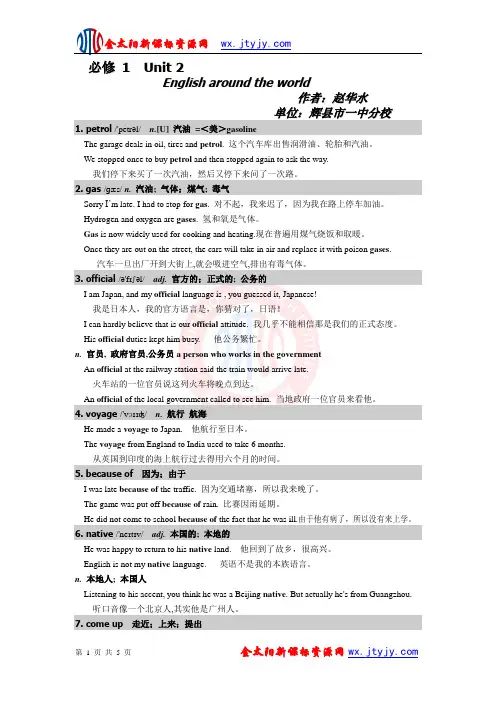
必修1U n i t2E n g l i s h a r o u n d t h e w o r l d作者:赵华水单位:辉县市一中分校1. petrol /'petrəl/ n.[U] 汽油=<美>gasolineThe garage deals in oil, tires and petrol. 这个汽车库出售润滑油、轮胎和汽油。
We stopped once to buy petrol and then stopped again to ask the way.我们停下来买了一次汽油,然后又停下来问了一次路。
2. gas /gæs/n.汽油; 气体;煤气; 毒气Sorry I’m late. I had to stop for gas. 对不起,我来迟了,因为我在路上停车加油。
Hydrogen and oxygen are gases. 氢和氧是气体。
Gas is now widely used for cooking and heating.现在普遍用煤气烧饭和取暖。
Once they are out on the street, the cars will take in air and replace it with poison gases.汽车一旦出厂开到大街上,就会吸进空气,排出有毒气体。
3. official/ə'fɪʃəl/ adj.官方的;正式的; 公务的I am Japan, and my official language is , you guessed it, Japanese!我是日本人,我的官方语言是,你猜对了,日语!I can hardly believe that is our official attitude. 我几乎不能相信那是我们的正式态度。
His official duties kept him busy. 他公务繁忙。
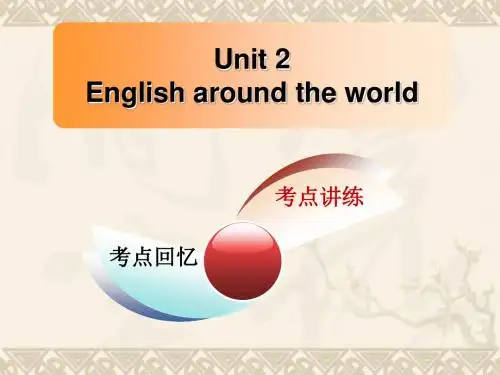
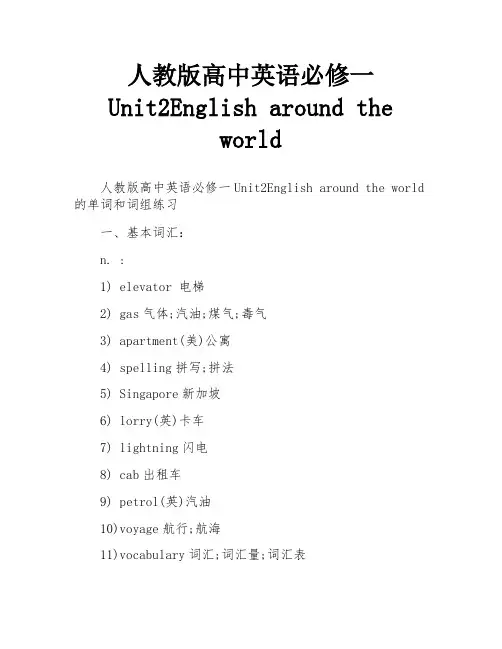
人教版高中英语必修一Unit2English around theworld人教版高中英语必修一Unit2English around the world 的单词和词组练习一、基本词汇:n. :1) elevator 电梯2) gas气体;汽油;煤气;毒气3) apartment(美)公寓4) spelling拼写;拼法5) Singapore新加坡6) lorry(英)卡车7) lightning闪电8) cab出租车9) petrol(英)汽油10)voyage航行;航海11)vocabulary词汇;词汇量;词汇表12)identity本身;本体;身份13)Malaysia马来西亚;马来群岛14)accent口音;腔调;重音15)block街区;块;木块;石块adj. :1) latter较后的;后半的;(两者中)后者的2) African非洲的;非洲人的;非洲语言的3) southeastern东南方的4) Midwestern中西部;有中西部特征的5) eastern东部的;东方的6) northwestern西北方的n./v. :1)base以……为基础;基部;基地;基础2)mand命令;指令;掌握;命令;指挥;支配3)request请求;要求n./adj.:1)native本地人;本国人;本国的;本地的2)Danish丹麦语;丹麦的;丹麦人的;丹麦语的3)Spanish西班牙人;西班牙语;西班牙的;西班牙人的;西班牙语的adj/adv.1) straight直接;挺直;直的;笔直的;正直的二、重点词汇:1) use n&v. 用处;使用 usage n.用法;词语惯用法2) express v.表达 expression n.词语;表达;表情3) recognize v. 辨认出;承认 recognition n.认出;识别;承认4) actually adv. 实际上 actual adj.实际上的5) graadually adv. 逐渐地;逐步地 gradual adj.逐渐的;逐步的6) fulently adv. 流利地 fluency n.流利;流畅 fulent adj.流利的7) frequently adv. 常常;频繁地 frequent adj.频繁的;常见的8) office n. 办公室 official adj.官方的三、重点短语:1) because of… 由于;因为because of和 because的区别:beccause of(后接词组或单词)because (作连词,后跟句子)eg:He was late not only because of his illness but also because he missed the train.不仅因为他的病痛而且因为他误了火车他才迟到的。
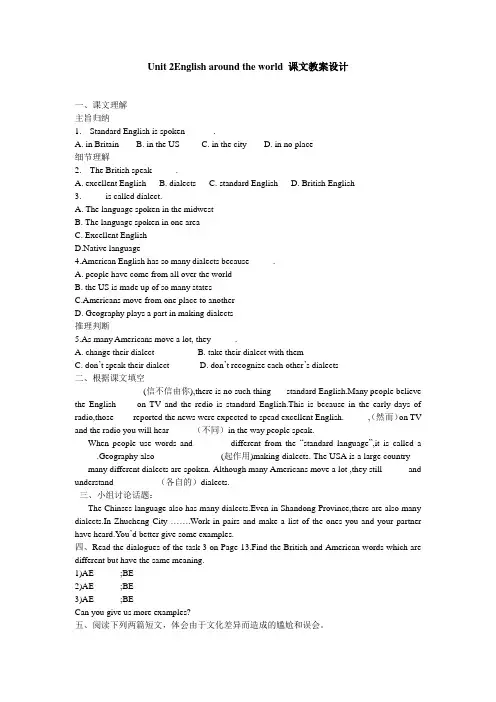
Unit 2English around the world 课文教案设计一、课文理解主旨归纳1.Standard English is spoken ______.A. in BritainB. in the USC. in the cityD. in no place细节理解2.The British speak _____.A. excellent EnglishB. dialectsC. standard EnglishD. British English3._____ is called dialect.A. The language spoken in the midwestB. The language spoken in one areaC. Excellent EnglishD.Native language4.American English has so many dialects because _____.A. people have come from all over the worldB. the US is made up of so many statesC.Americans move from one place to anotherD. Geography plays a part in making dialects推理判断5.As many Americans move a lot, they _____.A. change their dialectB. take their dialect with themC. don’t speak their dialectD. don’t recognize each other’s dialects二、根据课文填空____ __ __ ___(信不信由你),there is no such thing ___standard English.Many people believe the English ____on TV and the redio is standard English.This is because in the early days of radio,those ____reported the news were expected to spead excellent English. _____,(然而)on TV and the radio you will hear _____(不同)in the way people speak.When people use words and _______ different from the “standard language”,it is called a _____.Geography also ___ __ ____ ____(起作用)making dialects. The USA is a large country __ ___many different dialects are spoken. Although many Americans move a lot ,they still _____ and understand ____ ____ (各自的)dialects.三、小组讨论话题:The Chinses language also has many dialects.Even in Shandong Province,there are also many dialects.In Zhucheng City …….Work in pairs and make a list of the ones you and your partner have heard.Y ou’d better give some examples.四、Read the dialogues of the task 3 on Page 13.Find the British and American words which are different but have the same meaning.1)AE______;BE______2)AE______;BE______3)AE______;BE______Can you give us more examples?五、阅读下列两篇短文,体会由于文化差异而造成的尴尬和误会。
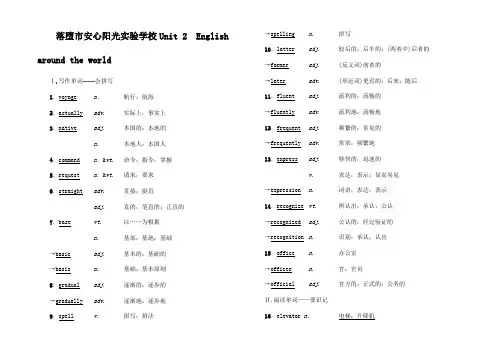
落堕市安心阳光实验学校Unit 2 English around the worldⅠ.写作单词——会拼写1.voyage n.航行;航海2.actually adv. 实际上;事实上3.native adj.本国的;本地的n. 本地人;本国人4.command n.&vt. 命令;指令;掌握5.request n.&vt. 请求;要求6.straight adv. 直接;挺直adj.直的;笔直的;正直的7.base vt.以……为根据n. 基部;基地;基础→basic adj.基本的;基础的→basis n. 基础;基本原则8.gradual adj.逐渐的;逐步的→gradually adv. 逐渐地;逐步地9.spell v. 拼写;拼法→spelling n. 拼写10.latter adj.较后的;后半的;(两者中)后者的→former adj.(反义词)前者的→later adv. (形近词)更迟的;后来;随后11.fluent adj.流利的;流畅的→fluently adv. 流利地;流畅地12.frequent adj.频繁的;常见的→frequently adv. 常常;频繁地13.express adj.特快的;迅速的v. 表达;表示;显而易见→expression n. 词语;表达;表示14.recognize vt.辨认出;承认;公认→recognized adj.公认的;经过验证的→recognition n. 识别;承认;认出15.office n. 办公室→officer n. 官;官员→official adj.官方的;正式的;公务的Ⅱ.阅读单词——要识记16.elevator n.电梯;升降机17.block n. 街区;块;木块;石块18.apartment n. 〈美〉公寓住宅;单元住宅19.vocabulary n. 词汇;词汇量;词表20.usage n. 使用;用法;词语惯用法21.accent n. 口音;腔调;重音22.lightning n. 闪电23.identity n. 本身;本体;身份高频短语——会默写1.at present 现在;目前2.make use of 利用;使用3.such as 例如……;像这种的4.play a part(in) 扮演一个角色;参与5.come up 走近;上来;提出6.because of 因为;由于7.be based on 以……为基础8.a number of 若干;许多9.believe it or not 信不信由你教材原句——会背诵句式仿写——能应用1.Native English speakers can understand 1.如果你微笑,即使你情绪不好,它也会立刻改善你each other even if they don't speak thesame kind of English.(even if引导让步状语从句)的心情。
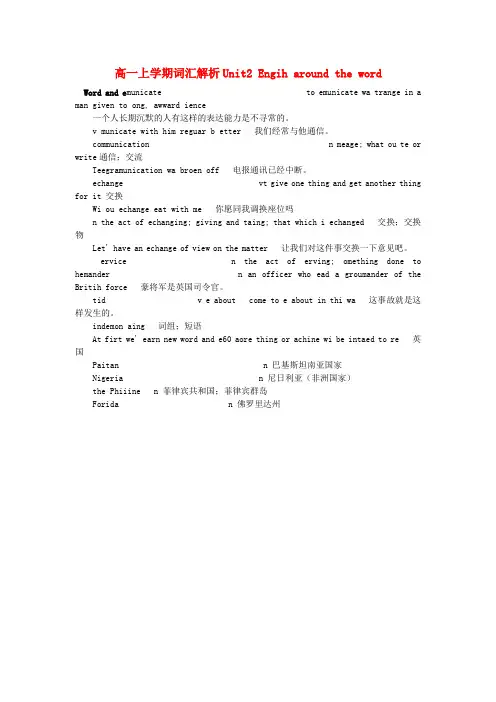
高一上学期词汇解析Unit2 Engih around the wordWord and e municate to emunicate wa trange in a man given to ong, awward ience一个人长期沉默的人有这样的表达能力是不寻常的。
v municate with him reguar b etter 我们经常与他通信。
communication n meage; what ou te or write通信;交流Teegramunication wa broen off 电报通讯已经中断。
echange vt give one thing and get another thing for it 交换Wi ou echange eat with me 你愿同我调换座位吗n the act of echanging; giving and taing; that which i echanged 交换;交换物Let' have an echange of view on the matter 让我们对这件事交换一下意见吧。
ervice n the act of erving; omething done to hemander n an officer who ead a groumander of the Britih force 豪将军是英国司令官。
tid v e about come to e about in thi wa 这事故就是这样发生的。
indemon aing 词组;短语At firt we' earn new word and e60 aore thing or achine wi be intaed to re 英国Paitan n 巴基斯坦南亚国家Nigeria n 尼日利亚(非洲国家)the Phiiine n 菲律宾共和国;菲律宾群岛Forida n 佛罗里达州。
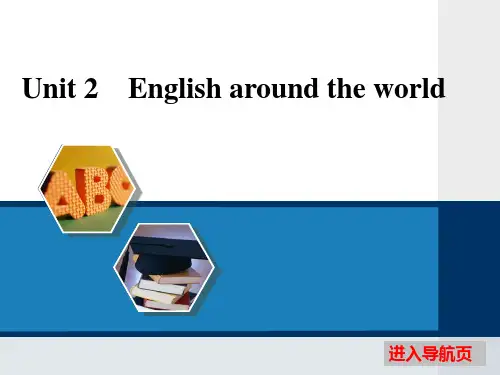

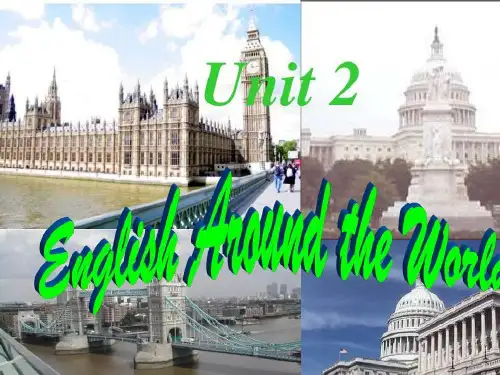

u n i t-2-E n g l i s h-a r o u n d-t h e-w o r l d课文及翻译the Road to Modern EnglishAt the end of the 16th century, about five to seven million people spoke English. Nearly all of them lived in England. Later in the next century, people from England made voyages to conquer other parts of the world and because of that, English began to be spoken in many other countries. Today, more people speak English as their first, second or a foreign language than ever before.Native English speakers can understand each other even if they don’t speak the same kind of English. Look at this example:British Betty: Would you like to see my flat?American Amy: Yes. I’d like to come up to you apartment.So why has English changed over time? Actually all languages change and develop when cultures meet and communicate with each other. At fist the English spoken in England between about AD 450 and 1150 was very different from the English spoken today. It was base more on German than the English we speak at present. Then gradually between about AD 800 and 1150, English became less like German because those who ruled England spoke first Danish and later French. These new settlers enriched the English language and especially its vocabulary. So by the 1600’s Shakespeare was able to make use of a wider vocabulary than ever before. In 1620 some British settlers moved to America. Later in the 18th century some British people were taken to Australia too. English began to be spoken in both countries.Finally by the 19th century the language was settled. At that time two big changes in English spelling happened: first Samuel Johnson wrote his dictionary and later Noah Webster wrote The American Dictionary of the English language. The latter gave a separate identity to American English spelling.English now is also spoken as a foreign or second language in South Asia. For example, India has a very large number of fluent English speakers because Britain ruled India from 1765 to 1947. During that time English became the language for government and education. English is also spoken in Singapore and Malaysia and countries in Africa such as South Africa. Today the number of people learning English in China is increasing rapidly. In fact, China may havethe largest number of English learners. Will Chinese English develop its own identity? Only time will tell.通向现代英语之路16世纪末期大约有5百万至7百万人说英语,几乎所有这些人都生活在英国。
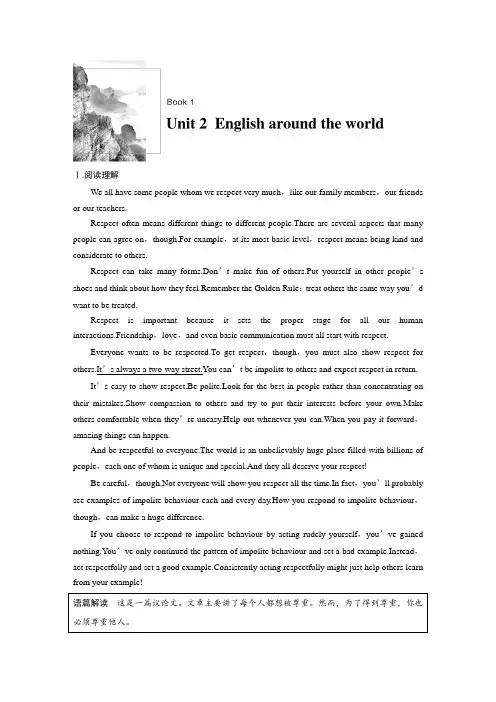
Ⅰ.阅读理解We all have some people whom we respect very much,like our family members,our friends or our teachers.Respect often means different things to different people.There are several aspects that many people can agree on,though.For example,at its most basic level,respect means being kind and considerate to others.Respect can take many forms.Don’t make fun of others.Put yourself in other people’s shoes and think about how they feel.Remember the Golden Rule:treat others the same way you’d want to be treated.Respect is important because it sets the proper stage for all our human interactions.Friendship,love,and even basic communication must all start with respect.Everyone wants to be respected.To get respect,though,you must also show respect for others.It’s always a two-way street.You can’t be impolite to others and expect respect in return.It’s easy to show respect.Be polite.Look for the best in people rather than concentrating on their mistakes.Show compassion to others and try to put their interests before your own.Make others comfortable when they’re uneasy.Help out whenever you can.When you pay it forward,amazing things can happen.And be respectful to everyone.The world is an unbelievably huge place filled with billions of people,each one of whom is unique and special.And they all deserve your respect!Be careful,though.Not everyone will show you respect all the time.In fact,you’ll probably see examples of impolite behaviour each and every day.How you respond to impolite behaviour,though,can make a huge difference.If you choose to respond to impolite behaviour by acting rudely yourself,you’ve gained nothing.You’ve only continued the pattern of impolite behaviour and set a bad example.Instead,act respectfully and set a good example.Consistently acting respectfully might just help others learn from your example!语篇解读这是一篇议论文。
“地毯式过单词”(人教版新课标)必修一Unit2 English around the world一、单词拼写(根据汉语或首字母提示写出单词的完全形式)1.I made friends with the (当地人),and they were concerned about me.【答案】natives【句意】我和当地人交朋友,他们都很关心我。
2.I paid a visit to Russia which is rich in natural resources and the travel(使丰富) my horizons.【答案】enriched【句意】我参观了资源丰富的俄罗斯,这次旅行丰富了我的视野。
st week some city o suggested the city might be interested in turning the old theater intoa museum and public meeting place.【答案】officials【句意】上周一些官员表态城市公众可能对把老剧院改造成博物馆和会议室感兴趣。
4.The ship will start its maiden (航行) next Monday,which makes me unable to keep calm.【答案】voyage【句意】下周一这艘船将开始它的第一次航行,这使我激动不已。
5.If you set down just one more new word each day,in the next year you will increase yourv by more than 300 words.【答案】vocabulary【句意】如果你每天记下一个单词,明年你就学会三百多个。
6.As you know,bamboo always stands s ,so it represents “noble”and “strong-willed”.【答案】straight【句意】正如你所了解的,竹子笔直代表着高贵与意志坚强。
高中英语必修一-U n i t2-E n g l i s h-a r o u n d-t h e-w o r l d重点单词短语及句型总结(总3页)-本页仅作为预览文档封面,使用时请删除本页-高中英语必修一Unit2 English around the world重点单词、短语和句型总结一、重点单词和短语1. because of 因为(后接名词、代词)2. a native speaker of English 以英语为母语的人3. more than one + n. 不止一个……more than one kind of English 不止一种英语4. come up走上前来;被提出;(太阳、月亮)升起He came up to me and said hello to me.The sun has come up.Your question came up at the meeting.come up with想出,提出(主语是人)I come up with a good idea. 想出一个好点子。
5. be based on以……为基础The film is based on his novel. 这部电影是根据他的小说改编的。
6. increase/enlarge vocabulary 增加/扩大词汇(量)7. make use of 利用;使用make full use of 充分利用 make the best of = make the most of 更好地利用We should make full use of time to recite English words.8. such as 例如Sweet food, such as chocolate can make you fat.=Such sweet food as chocolate can make you fat.9. command sb. to do sth. 命令某人做某事command that sb. (should) do sth. (从句中谓语用虚拟语气)obey the captain’s commands 服从船长的命令under the command of sb.=under sb’s command 在……的指挥下have a good command of English. 精通/熟练掌握英语10. request sth. 要求/请求得到,索要某物request sb. to do sth. 要求某人做某事= request that sb. (should) do sth.(从句中谓语用虚拟语气)11. play a part in 在……中担任角色/起作用12. make sense 有道理;有意义;讲得通13. hold on 别挂(电话); 坚持14. in the direction of 朝……方向from the direction of 来自……方向in all directions = in every direction 向四面八方15. put sth. down 写下;记下;镇压16. have fun with sth. 以……为乐17. believe it or not 信不信由你(常用作插入语,也叫独立成分)重点句子1. Native English speakers can understand each other even if they don’t speak the same kind of English.2. It was based more on German than the English we speak at present.3. By the 1600’s Shakespeare was able to make use of a wider vocabulary than ever before.4. One reason is that English has a large vocabulary.5. Believe it or not, there is no such thing as standard English.。
Unit 2 English around the worldWarming up1.More than多于,超过= over More than two thirds of the students went to see the movie.不仅,不只=only They are more than schoolmates. They are close friends.拓展:more A than B 与其说是B,不如说是A。
He is more hard-working than bright.2.In some ways 在某种程度上,在某些方面All the way 自始至终;by the way 顺便说一下;He support her all the way. By the way, there is a telephone message for you.3.Because of 因为,由于与because 的辨析Because of the storm, he didn’t go there; ( 后接名词/代词/宾从)Please be brief because i am in a hurry (引到原因状语)4..even if = even though Even if / though we don’t like it, we must do it.I’ll get there, even though / if I have to walk.Even though there is possibility I’ll be turned down, I want to express my true feeling to her.e up走过来,接近She came up and my heart was going to jump out of my throat.引申:发生Something has come up, so I won’t be able to see you tonight.(太阳)升起,上升The sun came up.引申:破土发芽The plants are just beginning to come up.归纳拓展:come up with 提出,想出come out 出版,发表The dictionary is being printed and it will soon come outCome across (偶然)遇见,碰到Walking in the street, I come across my Princess Charming.6.Over 在。